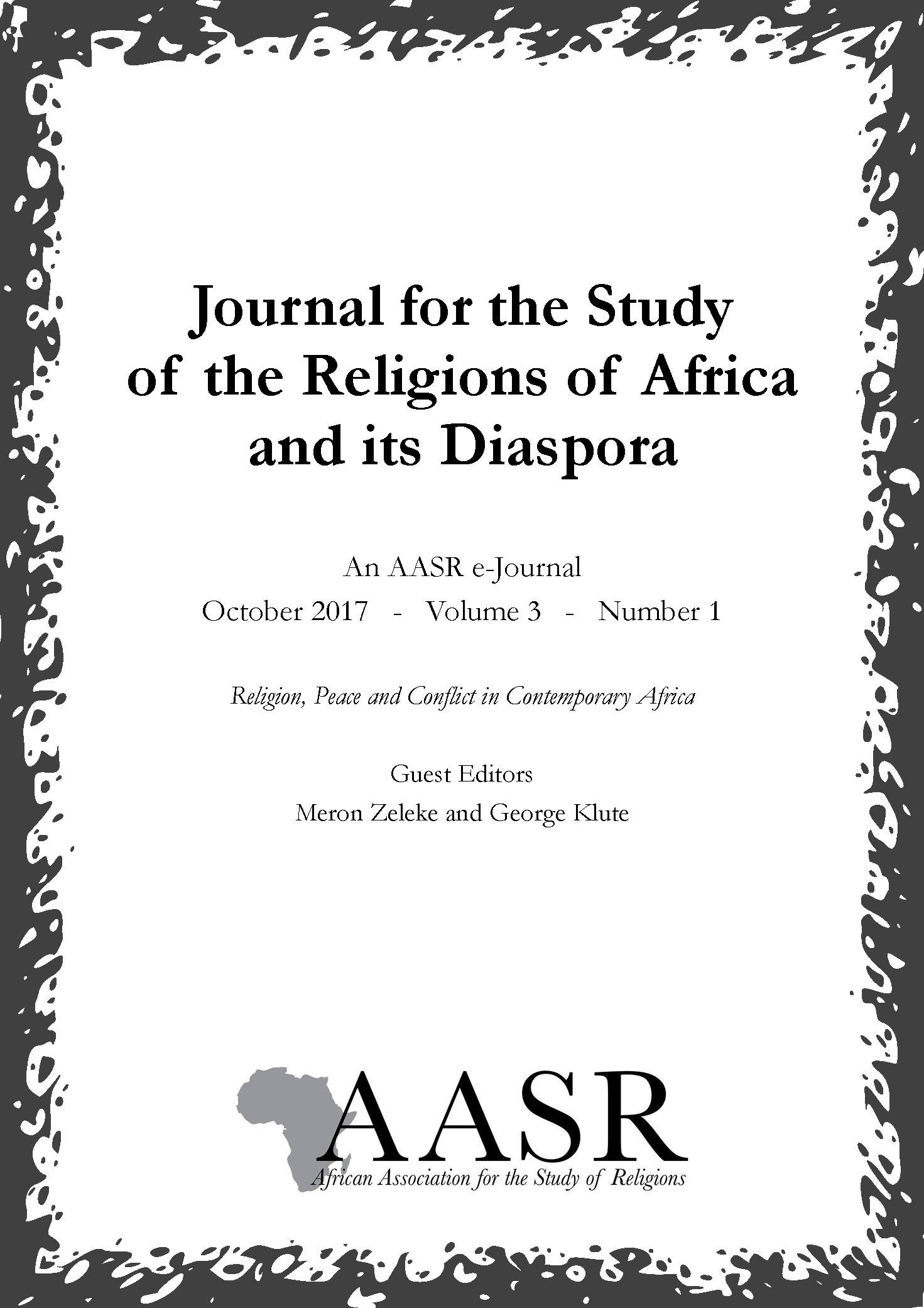The Religious Framing of the South Sudanese Civil Wars The Enduring Legacy of Ngundeng’s Prophecy
Main Article Content
Keywords
Ngundeng Prophecy, Dr. Riek Machar, South Sudanese Civil Wars
Abstract
This article discusses how a religious idea informed the political behaviour of South Sudanese leaders in the context of civil wars and the associated bitter contest for leadership. The prophecy which is invoked in the leadership contest in South Sudan is the prophecy of the 19th century Nuer prophet, Ngundeng Bong believed to predicted the course and outcome of the South Sudanese civil wars. At the centre of the prophecy is the prophetic power claim by one of the major political figures in South Sudan, i.e., Dr. Riek Machar and his leadership contest first with Dr. John Garang and currently with President Salva Kiir. In making sense of Machar’s self-understanding as a messiah, ‘predicted’ as it were by Ngundeng, the paper draws on the concept of political culture. It is argued that without endorsing Machar’s prophetic claim, it is imperative to understand the claim structure and how it is made plausible in the eyes of the believers, including Machar’s pragmatic mix of being a trained political strategist and a politician making use of a spiritual repertoire such as the enduring legacy of the Ngundeng prophecy featuring as a political capital.
Article Metrics Graph
References
Anderson, David, and Douglas Johnson, eds. 1995 Revealing Prophets: Prophecy in Eastern African History. London: James Currey.
Belete, B. 2013. Ethiopia's Role in South Sudan's March to Independence, 1955 -1991. African Studies Quarterly, Volume 14, Issues 1 & 2.
BICC. 2016. In Need of a Critical Re-Think Security Sector Reform in South Sudan. Working Paper, 6/2016.
Deng, F. 1995. War of Visions: Conflicting Identities in the Sudan. Washington: Brookings Institution Press.
Dereje, F. 2015. "Power and Its Discontents: Anywaa's Reactions to the Expansion of the Ethiopian State, 1950-1991". International Journal of African Historical Studies Vol. 48, No.1.
- - -. 2011. Playing different games: The paradox of the identification strategies of the Anywaa and the Nuer in the Gambella region, western Ethiopia. Berghahn books.
de Waal, Alex 2014 When Kleptocracy Becomes Insolvent: Root Causes of the Civil War in South Sudan. African Affairs 113(452): 347-369.https://doi.org/10.1093/afraf/adu028
Evans-Pritchard, E. 1940a. The Nuer: A Description of the Modes of Livelihood and Political Institutions of a Nilotic People. Oxford: Oxford University Press.
- - -. 1956. Nuer Religion. Oxford: Clarendon Press.
Hashimoto, E. 2013. Prophets, Prophecies, and Inter-Communal Conflict in Post- Independence South Sudan. Research report, Japan Society for the Promotion of Science.
Hunt, Lynn. 1984. Politics, Culture and Class in the French Revolution. Berkeley: University of California Press.
Hutchinson, S. 1996. Nuer Dilemmas: Coping with Money, War and the State. Berkeley: University of California Press.https://doi.org/10.1525/9780520354340
- - -. 2000. 'Nuer Ethnicity Militarized', Anthropology Today 16(3): 6-13. https://doi.org/10.1111/1467-8322.00024
- - -. 2001. 'A Curse from God? Religious and Political Dimensions of the Post-1991
Rise of Ethnic Violence in Southern Sudan', The Journal of Modern African Studies 39(2): 307-31.
- - -. 2005 Spiritual Fragments of an Unfinished War. In Religion and African Civil Wars. Neils Kastfeld, ed. Pp. 28-53. London: C. Hurst.
Hutchinson, S and N. Pendle. 2015. "Violence, legitimacy, and prophecy: Nuer struggles with uncertainty in South Sudan". American Ethnologist. Volume 42, Issue 3. https://doi.org/10.1111/amet.12138
Jok, Madut Jok, and Sharon Hutchinson. 1999. Sudan's Prolonged Second Civil War and the Militarization of Nuer and Dinka Ethnic Identities. African Studies Review 42(2):125- 145. https://doi.org/10.2307/525368
Johnson, D. 2014. "The fate of Ngungdeng's dang". Rift Valley Institute.riftvalley.net/news/fate-ngungdeng's-dang.
- - -. 2009. 'The Nuer Civil Wars', in G. Schlee and E.E. Watson (eds), Changing Identifications and Alliances in North-East Africa, Vol.II: Sudan, Uganda and the Ethiopia-Sudan Borderlands. Oxford: Berghahn, pp. 31-47.
- - -. 2011 The Root Causes of Sudan's Civil Wars. Rev. Edition. Woodbridge, UK: James Currey.
- - -. 1994. Nuer Prophets: A History of Prophecy from the Upper Nile in the Nineteenth and Twentieth Century. Oxford: Oxford University Press.
Nyaba, P. 1997. Politics of Liberation in South Sudan: An Insider's View. Kampala: Fountain Publishers.
PaanLuel Wël . "Ngundeng Bong traditional prophecy is responsible for the mess in South Sudan". https://paanluelwel.com/2016/11/23/ngundeng-traditional-prophecy-isresponsible-for-the-mess-in-south-sudan/, November 23, 2016
Pye, L.1968. The Spirit of Chinese Politics: A Psych Cultural Study of the Authority Crisis in Political Development. Cambridge, Mass.: Mit Press.
Ter Manynag Gatwech. 2016. The Nuer prophet Ngundeng Bong on Dr. Riek Machar teny's predicament victory in South Sudan. http://nyamile.com/2016/07/25/the-nuerprophet-ngundeng-bong-on-dr-riek-machar-tenys-predicament-victory-in-south-sudan/


